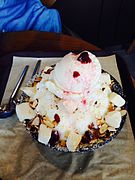Bingsu
-
 Media: Bingsu
Media: Bingsu
| Korean shaved ice | |
| Hangul | 빙수 |
|---|---|
| Hanja | 氷水 |
| Revised Romanization | bingsu |
| McCune–Reischauer | pingsu |
| IPA | [piŋ.su] |
| Red bean shaved ice | |
| Hangul | 팥빙수 |
| Hanja | 팥氷水 |
| Revised Romanization | pat-bingsu |
| McCune–Reischauer | p'at-pingsu |
| IPA | [pʰat̚.p͈iŋ.su] |
Bingsu (Korean: 빙수; Hanja: 氷水), sometimes written as bingsoo,[1] is a milk-based Korean shaved ice dessert with sweet toppings that may include chopped fruit, condensed milk, fruit syrup, and red beans.[2][3]
The most common variety is pat-bingsu (Korean: 팥빙수), the red bean shaved ice. The main ingredient of ice was natural ice in the past, but later artificial ice was produced and high-quality sweeteners were developed, and now it has been improved into boiled red bean shaved ice or fruit shaved ice mixed with various fruits. At first, the ice-cutting machine was a simple tool in the shape of a plane, but now the electric power is widely used after a manual rotation by hand.
History
Bingsu has similar origins to Sorbet with fruit and milk-flavoured ice-based confectionary being documented as far back as 400 BCE in Ancient Persia and China.[4] The earliest known documentation of ice-based desserts within Korea existed during the Joseon dynasty (1392–1897) which employed the use of crushed ice with various fruits, and were distributed from the ancient Korean ice storage called seokbinggo (Korean: 석빙고). [5][6]
After the Korean War, with the introduction of condensed milk, syrup, and chocolate from the United States, Korean bingsu began to become more diverse. western influences after the Korean War have brought further variation to the ingredients used in the dish, with foods such as cereal, ice cream, and whipped cream, being added to patbingsu.[7][8]
Varieties
Patbingsu (팥빙수, 팥氷水, sometimes anglicized as patbingsoo, literally "red beans shaved ice") is a popular Korean shaved ice dessert with sweet toppings that may include chopped fruit, condensed milk, fruit syrup, and red beans.[2]
The food began as ice shavings with red beans (known as pat, 팥). Many varieties of patbingsu exist in contemporary culture.
There are a variety of bingsu types and flavors. Some popular flavors are: green tea, coffee, and yogurt.[9][10]
In addition to the existing patbingsu, several Korean franchises have made shaved ice made from various ingredients such as Injeolmi shaved ice, melon shaved ice, coffee shaved ice, and green tea shaved ice. Now, bingsu can be found at almost every dessert shop in Korea.[11]
Gallery
-
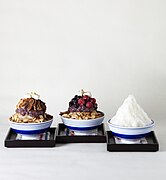 Various bingsu
Various bingsu -
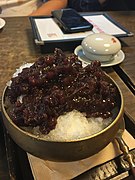 Patbingsu
Patbingsu -
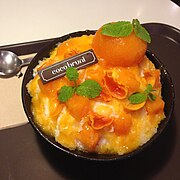 Persimmon bingsu
Persimmon bingsu -
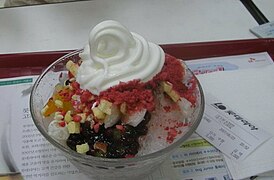 Bingsu with ice cream
Bingsu with ice cream -
 A yogurt bingsu
A yogurt bingsu -
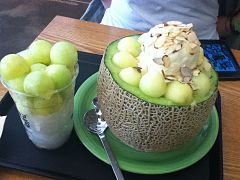 Melon bingsu
Melon bingsu -
 Patbingsu topped with fruits
Patbingsu topped with fruits - Berry bingsu
- Milk tea bingsu
-
 Black sesame bingsu
Black sesame bingsu -
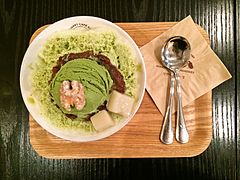 Green tea bingsu
Green tea bingsu -
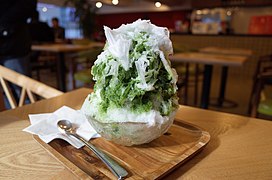 Green tea bingsu
Green tea bingsu - Cheese bingsu
-
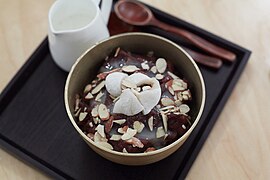 Patbingsu
Patbingsu -
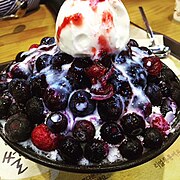 Mixed-berry bingsu
Mixed-berry bingsu -

-

See also
Shaved ice § Regions, for similar shaved ice variations around the world.
- Kakigōri: Japanese shaved ice
- Tshuah-ping: Taiwanese shaved ice
- Halo-halo: Filipino shaved ice
- Es campur and Es teler: Indonesian shaved ice
- Namkhaeng sai and O-aew: Thai shaved ice
- Ais Kacang (ABC, Ice Kacang): Malaysian/Singaporean shaved ice
- Grattachecca: Italian shaved ice popular in Rome.
- Hawaiian shave ice: Hawaiian shaved ice
References
- ^ Hoo, Winyan Soo (July 16, 2014). "Plate Lab: A guide to Asian shaved ice desserts halo-halo, bao-bing and bingsoo". The Washington Post. ISSN 0190-8286. Archived from the original on June 5, 2016. Retrieved May 5, 2016.
- ^ a b Lee, Robyn (June 5, 2009). "Snapshots from South Korea: Patbingsu, a Popular Shaved Ice Dessert". Serious Eats. Archived from the original on June 7, 2009. Retrieved January 5, 2013.
- ^ Kyoung Woo Jun, for (June 27, 2013). "Seoul hotels at war over dessert - CNN.com". CNN. Archived from the original on July 3, 2013. Retrieved May 5, 2016.
- ^ Marks, Gil (November 17, 2010). Encyclopedia of Jewish Food. HMH. ISBN 978-0-544-18631-6. Archived from the original on April 3, 2023. Retrieved March 21, 2023.
- ^ Dang, Tae Keuk (September 13, 2010). "Snowy delights and variations on bingsu". Herald Corporation. Archived from the original on May 16, 2021. Retrieved January 6, 2014.
- ^ 팥빙수[氷水] [Patbingsu]. Doopedia (in Korean). Doosan Corporation. Archived from the original on September 23, 2015. Retrieved January 6, 2014.
- ^ "Seoul Eats: The Origin of Patbingsu". Seoul Eats. Archived from the original on August 4, 2020. Retrieved August 9, 2020.
- ^ "Get ready for patbingsu: Red beans over shaved ice". The Jeju Weekly. Archived from the original on January 6, 2014. Retrieved January 2, 2022.
- ^ Lee, Ji-yoon (July 7, 2008). "Korea's cold summer taste - naengmyeon and patbingsu". Korea.net. Korean Culture and Information Service. Archived from the original on January 6, 2014. Retrieved January 6, 2013.
{{cite web}}: CS1 maint: bot: original URL status unknown (link) - ^ "Bingsu, an unbeatable summer treat!". Korea Tourism Organization. Archived from the original on January 6, 2014. Retrieved January 6, 2014.
- ^ Linda (October 12, 2019). "15 of the Best Bingsu in Seoul". Linda Goes East. Archived from the original on July 25, 2021. Retrieved June 11, 2021.
External links

- v
- t
- e
| Iced coffee | |||||||
|---|---|---|---|---|---|---|---|
| Slushies |
| ||||||
| Freezie | |
|---|---|
| Ice pop | |
| Shaved ice | |













